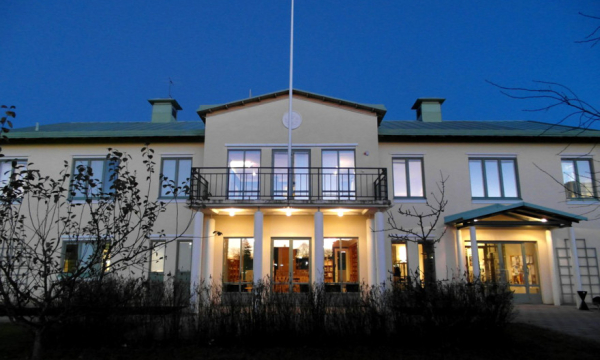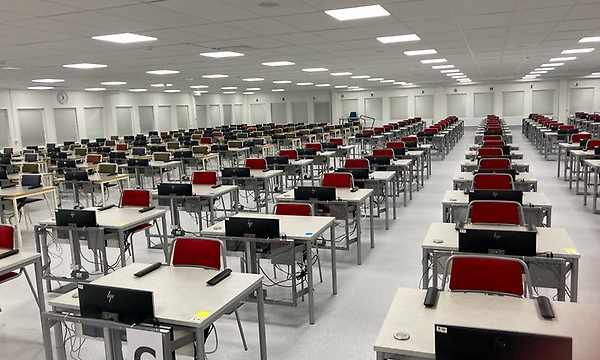
International students plead for reduced tuition fees
International students have made a petition urging the university to cut their tuition fees as they feel they are not getting what they are paying for through online teaching. The university says they are unable to make concessions in any other way than through scholarships.
26-year old Mostafa Elsaied came to Uppsala from Egypt in August this year to begin his one year master program in entrepreneurship. At home, he had worked as a doctor for one year, but quit his job to pursue further education.
– I didn’t choose Uppsala because it was cheap, the neighbouring countries are cheaper, I chose Uppsala because it’s one of the best universities in the world and because I wanted to have a full student experience, Mostafa Elsaied explains.
But it hasn’t quite been the experience he had hoped for. As everyone knows, Sweden and Uppsala isn’t under lockdown, but for Mostafa Elsaied it might as well have been.
"They need to take into consideration that we don’t get to use the university’s facilities and resources in the same way we normally would have."
Before the semester began, Mostafa Elsaied was informed by the university that their on-campus teaching would probably recommence on the 4th of November, but so far, all of his lectures have been online and he hasn’t been able to partake in any social activities or engage with any student nations, unions or organizations either. Still, he came to Uppsala where he currently resides in the Flogsta highrises. He pays around 10 000 Euros for his one year program which he might as well have pursued at home in Egypt, had he known the situation would be like this for the remainder of his program.
– I learned this week that the online teaching would continue at least for the first half of the spring semester as well. I might spend an entire year in Uppsala without actually seeing the inside of a lecture hall, without getting one single day of the Uppsala student experience.
This situation led to him and two other fee-paying international students starting a petition a few weeks ago, in the hopes of getting a partial monetary relief for the spring semester. As of today 262 people have signed the petition, which is addressed to the Vice-Chancellor of Uppsala University.
– We are not complaining about the online learning, most of us have already experienced this in our home countries, and we understand that these measures needed to be taken. But this is an extraordinary situation and therefore the university needs to take extraordinary actions and adapt the fees accordingly. They need to take into consideration that we don’t get to use the university’s facilities and resources in the same way we normally would have.
Mostafa Elsaied says that he had hoped to get a side job during his stay in Uppsala in order to pay for his subsistence, but with the pandemic this has become increasingly difficult. Especially since he has not yet received a coordination number (samordningsnummer), which you may receive in lieu of a personal identification number (personnummer) if you’re here for less than a year in order to, among other things, apply for jobs.
– They told me that the university need s to apply for a coordination number for me and I have asked them to do so, but so far they haven’t. I paid the tuition fee for the fall semester before I came here, and I had hoped to partially save up money for the spring by working here. But since that has not been an option I have had to borrow 50 000 kronor from a person I know. It’s a very stressful situation.
Mostafa Elsaied is just one of the many fee-paying international students affected by the measures taken to hinder the spread of Covid-19 throughout the university. Of course, exactly how much of an economical strain this has put on the day-to-day life of the international students varies from person to person, but, Mostafa Elsaied points out, the limitations of distance learning have affected the deliverance of education and thereby the learning outcomes for more or less all fee-paying students. They feel, to put it simply, that the education they are paying for is not the education they are getting.
– There are mainly three things that we feel we are missing out on. Firstly, we don’t get the face-to-face interaction and guidance from the lecturers. Seeing them in a small Zoom window is just not the same. Secondly, we’re missing out on connecting with the people in our classes, making friends and finding people to study with. And lastly, which for me is the most important factor, we don’t get to have a real student experience. I came here from Egypt, this is my first time studying abroad, and I have so far missed out on all campus and student organizations activities, competitions, and opportunities to network.
Uppsala university is in no way unique in the measures they have taken, in limiting on-campus learning, the situation is the same all over the world. But some universities have actually made concessions in regards to tuition fees, meaning that it shouldn’t be impossible for Uppsala University to do the same, argues Mostafa Elsaied.
The university has decided to create more scholarships to fee-paying students – isn’t that a reasonable solution to this problem?
– Yes, I heard about that. The problem is that the scholarships would only be available to some students. We want reduced fees for all students affected by this, that would be a fair solution.
"One of the main reasons many choose to study in Uppsala is to partake in the university community networking."
Jacob Färnert, President of Uppsala Student Union, has been informed of the petition and understands that fee-paying international students find this situation challenging.
– One of the main reasons many choose to study in Uppsala is to partake in the university community networking, which you will not get to do in the same way if you can’t meet your teachers and other students face-to-face. It might also make it more difficult to move on academically within the research community, says Jacob Färnert.
The student unions hope to raise the question of concessions for fee paying students with the University Board.
– There has been much talk about the situation for international students within the university all fall and they care a lot about international cooperation, so I’m sure they take these questions seriously. You should also give credit where credit is due – they have created more scholarships for fee-paying students because of this situation. What remains to be seen is if there is some wiggle room for a solution which may be closer to what the petitioners request. But the university plans ahead economically quite far, so I don’t know what’s realistic to expect. We’re just a month away from the spring semester, says Jacob Färnert.
"The decision was to switch to online teaching without compromising the quality of the programs."
It turns out, there seems to be little or no wiggle room to the university’s decision to offer scholarships rather than make fee concessions. Erika Dabhilkar is the Head of the Division for Internationalisation at Uppsala University. She says that no concessions will be made in regard to the tuition fees.
– We couldn’t make cuts to the fees even if we wanted to. When Sweden introduced tuition fees for international students from countries outside the EU/EEA in 2011, we did so under the governing principle of full cost coverage. Meaning that the fees we charge will need to cover the actual cost of the program per student. Nothing more, nothing less. The price is based on thorough calculations of direct and indirect costs, says Erika Dabhilkar.
The decision to charge tuition fees for international students from countries outside of the European Union, the Agreement on European Cooperation (EEA) and Switzerland, was made by the Swedish government ten years ago. The practical implementations of this ordinance was drawn up by SUHF - The Association of Swedish Higher Education Institutions, who decided that Swedish universities may not profit from the tuition fees, but rather charge just enough to cover the cost of these students’ education. The fees currently applied for programs at Uppsala University were set in 2014 and have not been adjusted since.
Erika Dabhilkar explains that the costs of running the university’s programs might not, as you might think, have decreased as a result of switching to online teaching to cope with the spread of Covid-19. In some areas they might actually have increased due to the added workload for many teachers and administrative staff.
– We understand that the students behind the petition feel that they are not getting what they paid for, but we cannot cut the fees based on that perception. The decision was to switch to online teaching without compromising the quality of the programs. We really feel for all students during these difficult times. Both international and local students that feel they miss out on an active student life, on meeting their peers, etcetera. We want all students to have all that.
About the full cost coverage - many students don’t get to use the university’s facilities and resources for lab assignments and other practical course moments which would normally be a part of their program’s curriculum. Can you really claim that resources they don’t get to use should be covered by their fees?
– The thing is, that the laboratories, facilities, and other resources, including the people working to maintain them, have to be paid for, regardless of whether someone is using them at a specific allotted time or not. That’s how the principle of full cost coverage works.
Though there will be no fee concessions across the board, Uppsala University has decided to offer scholarships specifically for fee-paying students who struggle economically due to the pandemic.
– The eligibility to apply for the scholarship is solely based on your financial struggles due to Covid-19. Perhaps your family that helps paying for your tuition has lost their company back home, or you might have lost your side income? The ongoing pandemic has affected the entire world economically. The scholarship initiative is Uppsala University’s way to alleviate this situation for some of the affected, says Erika Dabhilkar.
The Vice-Chancellor, Eva Åkesson, has decided to allot 2 million kronor annually for three years for this scholarship. The applicants will need to show that they have passed their courses from the year before. Those who receive it will have the scholarship money put directly towards their tuition fee bill. International fee-paying students who are here for at least two years will be eligible for the scholarship.
Erika Dabhilkar says that the university has had continued discussions throughout the fall semester on how the pandemic is affecting the university.
– The need to discuss how to continue to strengthen the quality of education with international exchange, even though students can’t physically go places, is more important than ever. To find ways of securing continued presence of international students in our programs is a matter of quality.
"This is not the big turning point in my life and my career that I have been dreaming of for many years."
For Mostafa Elsaied, the scholarship offered is of little comfort as he is only here for one year and is therefore not eligible for it. This situation is not, he says, what he expected when he found out he got accepted to Uppsala University back in April:
– I quit my job as a doctor. I planned to work here part time to afford the living costs and to cover part of the tuition fee, but after I arrived I found nothing was what I expected. After spending so much time trying to contact the university and writing the petition, I discovered that the only available kind of help the university can offer is the scholarship, and I am not even eligible for it. I feel totally lost now. I thought the university or the authorities here in Sweden would pay more attention to the stressful situation we are in, he says, and continues:
– I have done everything I possibly can – I made the petition, a crowdfunding campaign, I’ve tried to get a job, tried to seek help from my department, but NO is the only answer I have received. I don't even know to whom I should complain. This is not the big turning point in my life and my career that I have been dreaming of for many years. Now, I don't really know what I should do. I need to cover my living costs, my 4 330 kronor every month for the accomodation the university provides, and I need a miracle to be able to pay back my 50 000 kronor debt which is due in eight months. I don't have the right to CSN or any other kind of bank loan here in Sweden. And amidst all of this, I need to focus on my studies and my master degree. I am really frustrated. I just hope this time will pass.
Fee-paying students in numbers
595 fee-paying students began studying at Uppsala University the fall semester of 2020. There was supposed to be 697, but 102 couldn't make it here due to issues or delays with their visa or local restrictions due to Covid-19.
The cost for studying at Uppsala University depends on which disciplinary domain the program belongs to:
Humanities and Social Sciences: 100 000 SEK/academic year (level 1) or 120 000 SEK/academic year (level 2).
Science and Technology: 145 000 SEK/academic year.
Medicine and Pharmacy: 145 000 SEK/academic year (with the exception of the Medicine program, which costs 240 000 SEK/academic year).
The new scholarship for fee-paying international students is available for those studying here for at least two years. To be eligible for this scholarship you need to have passed your courses from the previous year and you need to have been negatively affected economically by Covid-19. The total funds allocated for this scholarship is 2 million SEK/year for three years.
More information on how to apply will come out in spring of 2021.


























